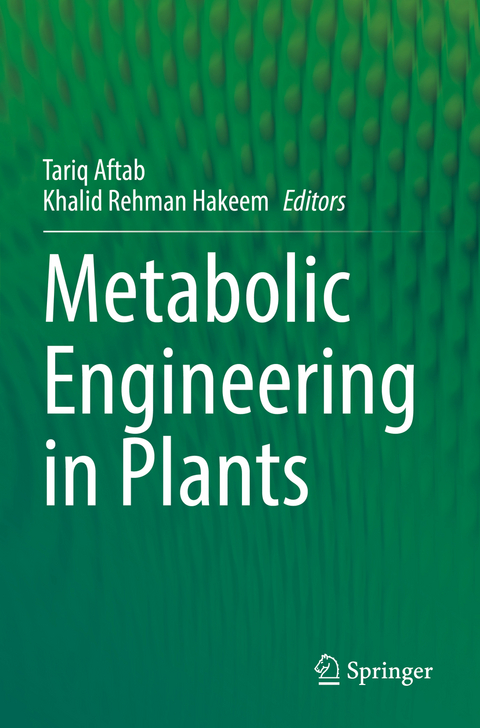
Metabolic Engineering in Plants
Springer Verlag, Singapore
978-981-16-7264-4 (ISBN)
Dr. Tariq Aftab received his Ph.D. in the Department of Botany at Aligarh Muslim University, India, and is currently an Assistant Professor there. He is the recipient of a prestigious Leibniz-DAAD fellowship from Germany, Raman Fellowship from the Government of India, and Young Scientist Awards from the State Government of Uttar Pradesh (India) and Government of India. After completing his doctorate, he has worked as Research Fellow at National Bureau of Plant Genetic Resources, New Delhi and as Post-doctorate Fellow at Jamia Hamdard, New Delhi, India. Dr. Aftab also worked as Visiting Scientist at Leibniz Institute of Plant Genetics and Crop Plant Research (IPK), Gatersleben, Germany, and in the Department of Plant Biology, Michigan State University, USA. He is a member of various scientific associations from India and abroad. He has edited 15 books with international publishers, including Elsevier Inc., Springer Nature and CRC Press (Taylor & Francis Group), co-authored several book chapters, and published over 75 research/review papers in peer-reviewed international journals. His research interests include physiological, proteomic, and molecular studies on medicinal and crop plants. Dr. Khalid Rehman Hakeem Khalid Rehman Hakeem, PhD is Professor at King Abdulaziz University, Jeddah, Saudi Arabia. After completing his doctorate (Botany; specialization in Plant Eco-physiology and Molecular Biology) from Jamia Hamdard, New Delhi, India, in 2011, he worked as a lecturer at the University of Kashmir, Srinagar, for a short period. Later, he joined Universiti Putra Malaysia, Selangor, Malaysia, and worked there as Post Doctorate Fellow in 2012 and Fellow Researcher (Associate Prof.) from 2013 to 2016. Dr. Hakeem has more than 10 years of teaching and research experience in plant eco-physiology, biotechnology and molecular biology, medicinal plant research, plant-microbe-soil interactions as well as in environmentalstudies. He is the recipient of several fellowships at both national and international levels; also, he has served as the visiting scientist at Jinan University, Guangzhou, China. Currently, he is involved with a number of international research projects with different government organizations. So far, Dr. Hakeem has authored and edited more than 70 books with international publishers, including Springer Nature, Academic Press (Elsevier), and CRC Press. He also has to his credit more than 140 research publications in peer-reviewed international journals and 60 book chapters in edited volumes with international publishers. At present, Dr. Hakeem serves as an editorial board member and reviewer of several high-impact international scientific journals from Elsevier, Springer Nature, Taylor and Francis, Cambridge, and John Wiley Publishers. He is included in the advisory board of Cambridge Scholars Publishing, UK. He is also a fellow of Plantae group of the American Society of Plant Biologists, member of the World Academy of Sciences, member of the International Society for Development and Sustainability, Japan, and member of Asian Federation of Biotechnology, Korea. Dr. Hakeem has been listed in Marquis Who’s Who in the World, since 2014–2019. Currently, Dr. Hakeem is engaged in studying the plant processes at eco-physiological as well as molecular levels.
Chapter 1. Metabolic Engineering: New approaches in Pharmaceuticals Production.- Chapter 2. Ameliorating abiotic stress tolerance in crop plants by metabolic engineering.- Chapter 3. Enhancing Photosynthetic Efficiency of Crop Through Metabolic Engineering.- Chapter 4. Transcription factor mediated plant metabolite production in response to environmental stress factors: current understanding and future aspects.- Chapter 5. Secondary Metabolite Engineering for Plant Immunity against Various Pathogens.- Chapter 6. Role of metabolic engineering in enhancing crop nutritional quality.- Chapter 7. miRNA and RNAi Mediated Metabolic Engineering in Plants.- Chapter 8. CRISPR/Cas genome editing in engineering plant secondary metabolites of therapeutic benefits.- Chapter 9. Enhanced Production of plant aromatic compounds through metabolic engineering.- Chapter 10. Molecular Farming: Sustainable manufacturing of vaccines, antibodies and other therapeutic substances.- Chapter 11. CRISPR/Cas Mediated Genome Engineering for Abiotic Stress Resilience in Plants.- Chapter 12. CRISPR/Cas Mediated Genome Engineering for Abiotic Stress Resilience in Plants.- Chapter 13. Use of Metabolic Engineering/Biotechnology in Crops Breeding and Development of New Crops .- Chapter 14. Improving the quality of medicinal and aromatic plants through metabolic engineering.- Chapter 15. Polymeric composites: A promising tool for enhancing photosynthetic efficiency of crops.- Chapter 16. Metabolic engineering approaches to produce compounds of interest in plants.- Chapter 17. Carbon-based Nanomaterials: An efficient tool for improving the nutritional quality of crops.- Chapter 18. Plant Metabolic Engineering for a Futuristic Economy.- Chapter 19. Ethical perspectives and limitations of metabolic engineering technologies in plants.
| Erscheinungsdatum | 08.06.2023 |
|---|---|
| Zusatzinfo | 1 Illustrations, black and white; XII, 413 p. 1 illus. |
| Verlagsort | Singapore |
| Sprache | englisch |
| Maße | 155 x 235 mm |
| Themenwelt | Naturwissenschaften ► Biologie ► Botanik |
| Schlagworte | Active constituents • biosynthetic pathways • Metabolic Engineering • Metabolomics • plant metabolites |
| ISBN-10 | 981-16-7264-4 / 9811672644 |
| ISBN-13 | 978-981-16-7264-4 / 9789811672644 |
| Zustand | Neuware |
| Haben Sie eine Frage zum Produkt? |
aus dem Bereich


